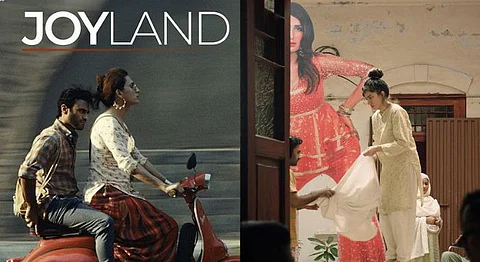
- HOMEGROWN WORLD
- #HGCREATORS
- #HGEXPLORE
- #HGVOICES
- #HGSHOP
- CAREERS
- ABOUT US
- CONTACT US

“I don’t think movies can change the world, but for me it’s okay to make a person feel something in the moment and let them sit with that feeling and that’s enough of a change; they will go back and think about it,” says Saim Sadiq, the director of Pakistani-queer drama — Joyland. Focusing on notions of masculinity, femininity and trans-identity, Joyland marked Pakistan’s first entrant for the category of Best International Feature Film for the 2023 Academy Awards.
Joyland was set to release in Pakistan on November 18 when 4 days before the premiere, it was banned by the Ministry of Information and Broadcasting alleging that it contains "highly objectionable material". The film received its screening certificate on August 17 soon after which it was met with protests and complaints by religious leaders, one of whom called it, 'cultural terrorism' because of the themes of homosexuality and the transgender protagonist in it.
The film is a bittersweet journey of a Pakistani family that is bound by rigid societal norms. It follows the inner conflicts and evolving queer identity of the lead character whose self-expression is bound by the patriarchal framework that is enclosed within. Much like the world over, Pakistan too is plagued by patriarchal and heteronormative notions, one that dictate behaviours and most importantly families.
The Urdu-language drama film, written and directed by Saim Sadiq, also marks his directorial debut feature film and stars actors Rasti Farooq, Alina Khan, and Sarwat Gilani. As the story unfolds we see the happily patriarchal Rana family crave the birth of a baby boy. Amongst the setup of this yearning for a boy, we see the youngest of the Rana men, Haider, secretly join an erotic dance theatre.
The theatre in the film becomes a space where he comes into his own; a space where he is no longer limited by the patriarchal and homophobic setup of his household. It also becomes a space of sexual exploration. He finds himself falling for a fiercely ambitious trans starlet — Biba. Their impossible love story slowly illuminates how the entire Rana family desires a sexual rebellion — whether it is Haider or the other Rana kids and daughters-in-law.
Film critic, Lovia Gyarkye of The Hollywood Reporter, said of the film, “It is a family saga, one that (the director) Sadiq uses to observe how gender norms constrict, and then asphyxiate, individuals” going on to term Joyland as “An aching consideration of gender and sexuality.”
Thousands of people shared the same sentiment. After the ban a massive amount of support came to its rescue with campaigns from in and outside the LGBTQIA+ community all around the world. Just yesterday the ban was lifted and the film is going to be screened on its original premiere date. “#Joyland has been cleared for release across Pakistan. The persistence of so many activists and artists has paid off,” added journalist Ailia Zehra of Naya Daur.
The whole controversy just goes to show that it is an important film of the times, with the sensitive portrayal of the complexities of sexuality and familial relationships. The intolerance and isolation the queer and trans community faces in Pakistan has forced a lot of its members to leave their home country over the years. But not everyone can afford that. In such a hostile environment, representation becomes the only solace for them. An emotionally moving film like Joyland that uses the bond of family to inspire love and acceptance can potentially bring transformation in a repressive culture. It is definitely a stepping stone in the long way to go before we extend the same level of compassion and empathy to trans individuals and queer folks both on-screen and off.
Follow Saim Sadiq’s work here.
Watch his other short films here.
If you enjoyed reading this, we also suggest:
